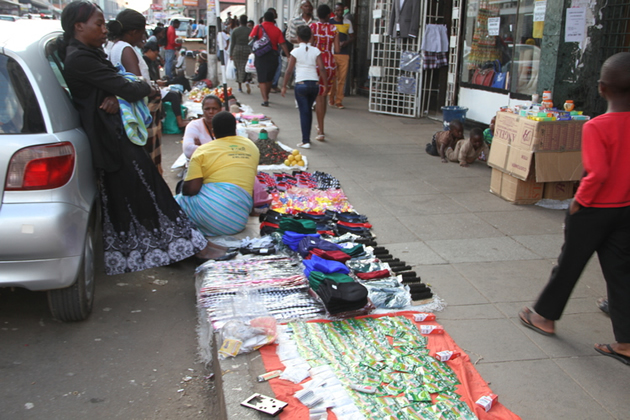Whither Workers’ Day?

 Herald Reporters
Herald Reporters
It was business as usual in Harare yesterday. Vegetables, men’s and ladies’ shoes, clothes and other wares covered the city’s pavements while at flea markets scores of people walked in and out in search of products and services, most of which were readily available as is always the case.
Commuter omnibus drivers and touts continued to be a menace on the roads as they ferried people while most supermarkets and clothing shops remained open.
In many offices and home industries, people came to work, to catch up on a few outstanding orders.
The day was Workers’ Day, celebrated on May 1 the world over.
Yet, the day to commemorate workers’ struggle for better conditions turned out just like any other.
The celebrations around Harare were overshadowed by the numbers that trickled to various workplaces both in the formal and informal sectors.
The picture was almost the same countrywide.
Only a few people turned up for commemorations at various venues.
The number of people attending the commemorations continues to dwindle each year because of the drastic change in the political economy of the country which has seen many venturing into the informal sector.
The situation has been compounded by the politicisation of labour unions with two of the country’s largest workers’ representatives – the Zimbabwe Federation of Trade Unions and the Zimbabwe Congress of Trade Unions – aligning themselves to political parties.
ZFTU held its main celebrations in Bulawayo under the theme “Workers united, more informed and ready to embrace Zim-Asset programmes” while the ZCTU’s Harare celebrations were held under the theme “Workers under siege: Arise and fight on”.
Scores of workers in the food industry turned up for celebrations organised by the United Food and Allied Workers’ Union of Zimbabwe in Mbare.
UFAWUZ president Mr Cleopas Tongwe conceded that there was a decline in the number of people commemorating Workers Day and politics had taken a toll on the event.
“However, it is only a question of educating the workers,” he said.
“This is our day which we should commemorate whether one is in the informal sector or the formal one. A difference in ideologies is also one factor and we are an example of that as we were chucked out from ZCTU in 1992 because of ideological differences. This is our first commemorations since then.”
The union held the celebrations under the theme “Towards the refoundation of an independent, democratic and united labour movement to fight against the barbarism of neo-liberalism”.
It was business as usual at Siyaso, Magaba, Mupedzanhamo markets and Zindoga Shopping Centre in Harare.
Those in the informal sector said they no longer had anything to do with Workers’ Day.
“At Siyaso I only rest when someone close to me has died,” said Mukuvisi Manufacturing Co-operative Union secretary, Mr Steven Hove.
Taking a break results in a loss as they are self-employed, he says.
“If you do not work for yourself, who will? We only leave this area if there is an emergency or some national events like Independence Day.”
Mrs Sarah Mafunga said she was not even aware of the venues where the commemorations were being held.
“Gone are the days when we used to gather at a certain venue waiting for an address from anyone.
“The distress of several companies has seen a greater percentage of people finding refuge in the informal sector or being employed in the quasi-retail sector and the transport business,” she complained.
The situation has been worsened by the illegal sanctions regime that drove many out of formal employment as large corporates either closed, retrenched or froze new recruitments.
Government has lamented that more than US$7 billion could be circulating in the informal sector while 5, 7 million jobs had been created from 2,8 million small businesses.
Some chose to hang out at popular braai joint KwaMereki.
These felt May Day should be redefined as it was no longer about celebrating the successes and rights of the workers but the alignment of the unions to certain political parties.
The ZCTU has been the biggest culprit, whose central role in the formation of the MDC in 1999 resulted in greater focus on political issues instead of labour mat- ters.
“Their strong link to politics means the May Day will always be a damp squib,” said Mr Simbarashe Tiki.
He adds: “Trade unions should not be affiliated to any political party because that is what drove people away from the unions. Let us redefine the labour movement and desist from politics.”
Workers like Mr Tinashe Magaya said by attending the celebrations, he felt used by the unions.
“The unions have failed to represent us and unless they are revamped, I will not be part of those celebrations,” he said.
At Glen View Area 8 Home Industry Complex Mr William Jiriyengwa, who makes beds, said although he valued the ideals of the day, he could not afford to rest on the day.
“It is a day that I know and value but as someone who is self-employed I cannot afford to take the day off because I might lose out on business,” he said.
Mr Jiriyengwa said he supported Government’s indigenisation drive but lamented they needed more support to realise their potential.
“The Government’s indigenisation programme is a noble one and I think what is left is for us to be given more support like access to finance and factory shells so that we don’t incur losses due to the vagaries of the weather,” he said.
Mr Vincent Marimo, who also operates from the same complex making lounge suites, said he was comfortable being self-employed but also urged Government to do more to support upcoming entrepreneurs.
“I am comfortable being self-employed but it would make our work easier if we had access to cheap financing. Business is good and we have the potential to do more if Government assists us,” he said.
Speaking on the sidelines of commemorations led by the ZCTU at Gwanzura Stadium in Highfield, Mr Alexio Chiundura, who works at a fast food outlet, said there was nothing much to celebrate given the tough times that workers were enduring.
“As I speak, there is talk of retrenchment where I work and I am not even sure if I will be still employed tomorrow,” Mr Chiundura said.
Zimbabwe Energy Workers Union (Zewu) secretary Mr Martin Chikuni said Workers’ Day celebrations are a time for the working class to reflect on their past, analyse their current situation and draw a future roadmap in an effort to advance workers’ interests.
“As we commemorate Workers’ Day, it is important to note the challenges we are confronted with such as the retrenchment of workers, employers preferring contract workers and company closures.
“It is important to have a day like this so that workers meet and address these issues,” said Mr Chikuni.
Medical Professionals Allied Workers’ Union of Zimbabwe president Mr Bernard Chirenje said May Day is a time for the professionals to reflect on the issues affecting them.
Top of the list was compulsory retrenchment.
This, he said, was also negatively affecting the private health sector.
The non-remittance of medical aid subscriptions had resulted in non-payment of salaries, he noted.
“The private health sector is also affected by the forced retrenchments. As representatives of health workers in the private sector, we say no to the retrenchments and the casualisation of labour,” said Mr Chirenje.
College Lecturers’ Association of Zimbabwe (Colaz) general secretary Mr Nickson Madovi said while May Day celebrations are a time when the working class from the public and private sector shared experiences, it was also a time to call for unity.
In Chinhoyi, ZFTU vice president Cde Batsirai Musona took a swipe at National Employment Councils saying they had abrogated their duty to fight for workers’ interest to sup with the employers.
This, he said, had resulted in cases involving workers and their employers taking too long to be finalised.
Some have even died before getting their dues.
The George Nkiwane-led ZCTU also held commemorations at Alaska Dolomite Primary School in Alaska.
About 300 people who gathered were later entertained by various groups including gure and chihodha dances among others.
A farm worker, Vengai Mavheneke, said working and living conditions should be improved in farms.
“One of our major challenges as workers is that we are going for months without being paid while in some cases our living conditions are not healthy,” he said.
He called on farmers to pool resources together to build schools so that pupils do not walk long distances and others do not drop out of school completely.
There was a low turnout at commemorations in Kariba where scores gathered at Nyanhehwe Primary School grounds and at Mahombekombe Park.
Sources said the low turnout could be a reflection of dwindling confidence in workers’ unions and that more people are now in the informal sector.







Comments